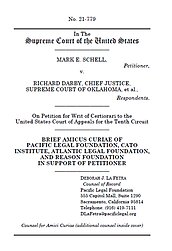Learn more about Cato’s Amicus Briefs Program.
In every state and the District of Columbia, there is a bar association that regulates the practice of law. Some state bars, however, go beyond simply administering the bar exam and other licensing requirements and require attorneys to be dues-paying members of the bar association. In many of those states, the bar association spends attorneys’ forced-dues on various political and ideologically charged issues. That’s a problem under the First Amendment, especially after the Supreme Court’s 2018 decision in Janus v. AFSCME.
In Janus, the Court overturned a 41 year-old precedent that allowed public-sector unions to collect mandatory dues even from those who didn’t want to be part of the union. The Court ruled that, because public-sector unions are inherently political entities, taking dues from nonmembers was a form of forced political speech. Making someone financially support a group’s political actions violates the First Amendment.
After Janus, the question remained whether other types of forced dues might violate the First Amendment. Many challenges were filed against mandatory-dues state bar associations, and the Court now seems interested in these challenges. In Jarchow, a case challenging Wisconsin’s mandatory bar dues which Cato also supported, Justice Thomas and Justice Gorsuch dissented from the Court declining to hear the case.
Robert Schell has practiced law in Oklahoma since 1984 and has paid mandatory dues the entire time. The Oklahoma Bar Association has often spent his money supporting causes with which Schell disagrees, such as opposing tort reform. Schell challenged the mandatory dues system as a violation of his First Amendment rights. He lost at the district court and in the Tenth Circuit.
Schell now asks the Supreme Court to take his case. Cato has joined the Pacific Legal Foundation, the Atlantic Legal Foundation, and the Reason Foundation on an amicus brief supporting Schell. We argue that state bar associations obviously use mandatory dues on political speech, and such practices clearly violate the holding Janus. The Supreme Court should take Schell’s case and hold that mandatory bar dues used for political advocacy violate the holding in Janus.

This work is licensed under a Creative Commons Attribution-NonCommercial-ShareAlike 4.0 International License.


